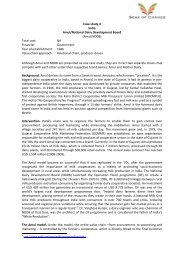Collection of Case Studies 2. - Seas of Change Initiative
Collection of Case Studies 2. - Seas of Change Initiative
Collection of Case Studies 2. - Seas of Change Initiative
Create successful ePaper yourself
Turn your PDF publications into a flip-book with our unique Google optimized e-Paper software.
can be concluded that over 3,800 households were supported by the first pilot phase <strong>of</strong> RARP. There isanecdotal evidence that the pilot has contributed to increases in yields <strong>of</strong> maize and verification through anindependent study is planned. According to FAO, a farmer with adequate inputs achieves a minimum 1.3 metrictonne/ha while those without inputs harvest anything from 0 to 700 kg/ha.At the end <strong>of</strong> the main agricultural season in May 2011, RARP II achieved the following results: 659 agro-dealers were linked to wholesalers and received agricultural inputs at consignment base in the2010/2011 season. Nationwide 469 agro-dealers were trained in retail business management, including 104 female agrodealers(2<strong>2.</strong>2%). 560 agro-dealers received mentoring and coaching sessions delivered through 12 Local CapacityBuilders. Crop product guides for maize, groundnuts and sorghum and inputs product promotion information weredistributed through agro-dealer shops. Inputs worth over US$9 million were distributed through vouchers and cash sales. The inputs wereleveraged by US$112,500 worth <strong>of</strong> insurance. An estimated 113,800 smallholder farmers accessed inputs from the programme. 165. What are the key implications for scaling inclusive business?Zimbabwe, prior to the economic collapse, had a vibrant market for agro-inputs. The collapse <strong>of</strong> that marketmeant that rural shops had no access to inputs. Wholesalers and manufacturers would not stock rural shops for avariety <strong>of</strong> reasons, including but not limited to violence, theft, low volume <strong>of</strong> business and infidelity. RARP,through the insurance, made it possible for the wholesalers and the manufacturers to place consignment stockwith the agro-dealers again.Insurance played a crucial role in catalysing the inclusive business relationships. Due to this risk sharingmechanism (with donors who provided insurance and facilitated capacity building especially for the rural shopowners), wholesalers were encouraged to place consignment stock with the rural shops. The low claims on theinsurance provided confirmed that the rural shop owners could indeed be reliable business partners.Risk associated with rural shop owners was lowered by the business training that was facilitated by SNV.Wholesalers are now more comfortable doing business with them as they feel that they now understand thebusiness. SNV established a framework that ensured that agro-dealers are monitored and mentored throughoutthe programme. Local Capacity Builders were appointed in each <strong>of</strong> the eight provinces to visit agro-dealers atleast once every six weeks to mentor them on their store-specific needs. Agro-dealer Associations will be formedat a district and provincial level, with potential to form national agro-dealer associations to lobby for nationalissues.By the establishment <strong>of</strong> trust and lowering risks, a win-win situation was created for wholesalers, agro-dealersand rural farmers. Total sales <strong>of</strong> US$9.3 million recorded by the rural shops under RARP II proved beyond doubtthat both wholesalers and agro-dealers could make meaningful pr<strong>of</strong>its from the business relationships. Above all,it proved that rural farmers do have the capacity to purchase inputs.The availability <strong>of</strong> the right inputs in time led to increased productivity among farmers, which eventually led t<strong>of</strong>urther strengthening <strong>of</strong> business relationships between companies and rural farmers. Many companies haveshown interest in applying for bridging finance through ZADT for entering into contractual relationships with thefarmers for the supply <strong>of</strong> produce. While farmers can realise increased productivity with improved access toinputs and good agricultural practices, from SNV experience, the problem has been that it is farmers have notalways got a contracting company to access markets. The majority <strong>of</strong> farmers have to rely on spot trade ortaking their produce to markets. With this lack <strong>of</strong> organisation, this has tended to be very onerous and the returnsvery low. Someone who can identify markets and buy from a pool <strong>of</strong> farmers in a region will lower transactioncosts for everyone, helping farmers to access better prices for their produce. This acts as an incentive forfarmers to produce more and get better incomes. The establishment <strong>of</strong> ZADT will enable the scaling-up <strong>of</strong> therelationships. Contracting companies will be in a position to access funds and thereby contract many smallerholder farmers, whilst wholesalers will use funds to stock more rural shops and processing companies, includingSMEs and traders will be able to get loans to purchase produce from the farmers.16These figures are based on an estimated 200 clients served by each <strong>of</strong> the 659 agro-dealer shops.36







